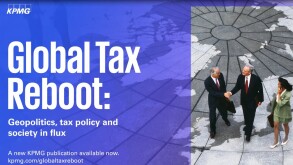There was a time not long ago when a company was evaluated on an after-tax basis, and it would benchmark its effective tax rate (ETR) against those of its peer group or industry. Corporate tax was a line item that needed to be managed, and management regularly sought opportunities to achieve a more favorable ETR. Investors and shareholders in companies often received little in-depth information about a company’s tax policies. This often created an environment where companies adopted strategies focused on cross-border financing arrangements, transfers of IP to low-tax jurisdictions, and transfer pricing as opportunities to create enterprise and shareholder value through tax base erosion.
While many of these strategies followed the letter of the law, they often leveraged tax law mismatches between countries or moved income producing assets to low tax jurisdictions. Recent efforts by the EU, OECD, and country-specific initiatives are working to tighten rules around previously common tax planning opportunities and promote the idea of responsible tax into the public discussion. These movements predated COVID-19 and were changing the perception of what is an appropriate tax strategy.
COVID-19 has increased the focus on tax revenues, spotlighting government and public awareness of tax planning structures. Taxpayers have become acutely aware of the downside to adverse publicity related to previously common (but now called 'aggressive') tax strategies that were within the letter of the law, but not necessarily the spirit. Further, environmental, social and governance (ESG) initiatives are helping investors identify sustainable investments, including through the lens of tax policy.
Stakeholders, through public disclosure, board pressure and shareholder activism, are tasking C-suites and managers to pursue a responsible tax policy. Some companies have published their tax policies and prepare public annual tax reports outlining their contributions to direct and indirect taxes. BP recently published their 2019 Tax Report highlighting the desire to “facilitate more informed conversations with our stakeholders about our contribution to economic development and the part we play in society, as well as the rigor of our tax practices.”
Advancing responsible tax policy
Institutional Investors are taking a leading role advancing responsible tax policy – at both the organisation and the investee/portfolio company levels. Norges Bank believes that responsible corporate tax plays an important role in societies and has made this one of its investment principles. Nicolai Tangen, CEO, told the Norwegian Parliament that it had recently divested from companies with weak or no reporting related to tax and transparency.
PensionDanmark, ATP, PFA and Industriens Pension published a common set of principles embedded in a “tax code of conduct” in August 2019, encouraging responsible tax policy in its investment portfolios through the establishment of clear guidelines on acceptable and unacceptable behaviour.
As more Institutional Investors develop similar policies, their focus on tax policy has the potential to be substantial. For example, divestment from investee companies can create downward pressure on stock prices, increase a company’s cost of capital and reduce management compensation. Asset managers are also affected - we are observing some asset managers proactively disclose their tax policies to new investors to attract capital and to avoid the risk of divestment by existing investors. The movements by Norges Bank and others are putting companies on notice that they will be assessed for responsible tax stewardship, with the hope that this will help drive responsible tax policy.
This pressure will continue to build for investors and investee companies as the ESG movement continues to evolve. It is increasingly understood that tax is an important component of the governance in ESG. Institutional Investors are looking for approaches to accurately evaluate their portfolios for compliance with their ESG policies. This can be a challenging task for both investors and investees, particularly given the fast pace of regulatory changes and evolving stakeholder expectations.
KPMG firms bring together expertise from our institutional investors, funds, and public market groups providing clients with a 360-degree perspective to understand current preferred practices and anticipate future market expectations. We have developed tools to help assess the tax profiles of public and private companies using publicly available information. Leveraging insights from KPMG tax specialists across the world, we utilise proprietary AI technology paired with specialist review to provide advice and identify opportunities based on client’s needs. KPMG firms’ clients are using this technology to screen historic portfolios, assess new companies and monitor existing portfolios to meet their internal tax policies.
































